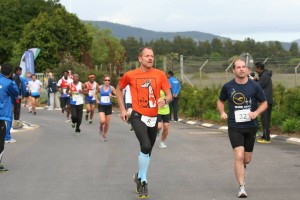
If you follow the tips below you can recover fast, and enjoy Calgary with friends and family.
FUELING BEFORE A MORNING RUN
It is critical to your energy and performance to eat at least a small amount prior to your run.
The goal of a small breakfast is to ensure you have enough energy to run at your optimal level after an overnight fast.
Don't ever skip breakfast completely. Try to eat or drink small amounts of carbohydrates (15-30 grams) within the 30 minutes leading up to your run. Dry cereal never fails!
An early morning shakeout or recovery run of 30-60 minutes may not require a large amount of carbohydrates and you may feel fine with just a yogurt, dry cereal, fruit, or a sports drink.
For a run longer than one hour, aim to eat a slice of toast with peanut butter or cereal/oatmeal and a banana. Eating before a long run will help sustain your energy and can help prevent "hitting the wall."
Pre-run food should be high in carbohydrates, which digest quickly and provide the primary fuel for working muscles. A small amount of protein will keep you feeling satisfied without slowing you down. Avoid excess fat, which digests very slowly, making you feel sluggish.
Practice what you might do on race day on training days. That's what practice is for!
One hour or less before run
Stick to liquids like water, sports drinks and avoid beverages like soda, juice, drinks or "energy" drinks
Fruit
Granola bar (<5 gm of fibre)
FUELING DURING A RUN
The goal of fueling during a run is to maintain energy levels through adequate carbohydrate intake and to maintain hydration.
If running less than one hour, water alone will hydrate just fine.
Sports drinks provide fluids, carbohydrates, and electrolytes to sustain both energy and hydration.
Drink full strength regular sports drinks and not reduced calorie versions or "fitness" waters for runs longer than one hour.
Recommendations:
Establish a hydration plan and fueling plan
Use Gels, Blocks, Beans, or Stingers – just make sure you are used to them before you start including them on race day.
IMPORTANCE OF HYDRATION
Losing as little as 2% of your body weight can mean dehydration that can affect performance and recovery.
Water is a great hydrator. During intense workouts or longer duration exercise (> 60 minutes) sports drinks are a better choice because they not only hydrate, but also replaces carbohydrates and electrolytes (sodium, potassium, etc. lost in sweat).
Establish a hydration plan for your runs:
Aim for a few gulps (1/2 to 1 oz per gulp) of sports drink or water at every break during runs this will prevent under hydrating or over hydrating. (4-8 oz every 15-20 minutes)
Dehydration
Can happen easily to runners, even in cold weather.
Symptoms can include fatigue, headache, weakness, dizziness, cramps, irritability, poor performance, increase in core body temp, and increased risk of injury
More severe symptoms include: Chills, vomiting, nausea, rapid heart rate, and heat stroke
Be sure to check your urine color. You want it to be barely yellow
Hyponatremia
Over hydration (low blood sodium)
Happens when taking in a lot of water and not taking in enough sodium (like in salty foods on course or in sports drinks)
True hyponatremia is fairly rare. Prevent it by making sure you alternate between water with sports drinks containing sodium and/or eat salty foods during your run.
RECOVERY NUTRITION
Think the 3 R's: Refuel with carbohydrates, Rebuild with protein, and Rehydrate with Fluid.
Aim for within 30 minutes of your run to refuel with food. This is the short window after a workout in when storage of fuel is maximized. It is critical that you re-fuel as quickly as possible to prepare for your next run and to prevent injury.
Aim for primarily carbohydrates within the 30-minute window and get your protein and additional carbs within 2 hours after exercise.
If you know you struggle to eat a post-run meal due to a lack of time or appetite, drink a fluid replacement drink that has carbs and protein like chocolate milk, a smoothie, or recovery beverage.
Follow your liquid snack/meal with a recovery meal 1-2 hours after that to complete your refueling needs.
The combination of not eating before a run followed by a lack refueling after your run will lengthen your recovery time and potentially lead to injury and fatigue.
Goals for recovery are to rehydrate, replenish muscle glycogen stores and to prevent injury.
It is not uncommon for a morning run to suppress a hearty appetite. If you're not hungry, try to force yourself to get something down during that critical 30-minute window, especially after a hard run. When you want it the least is when you need it the most!
